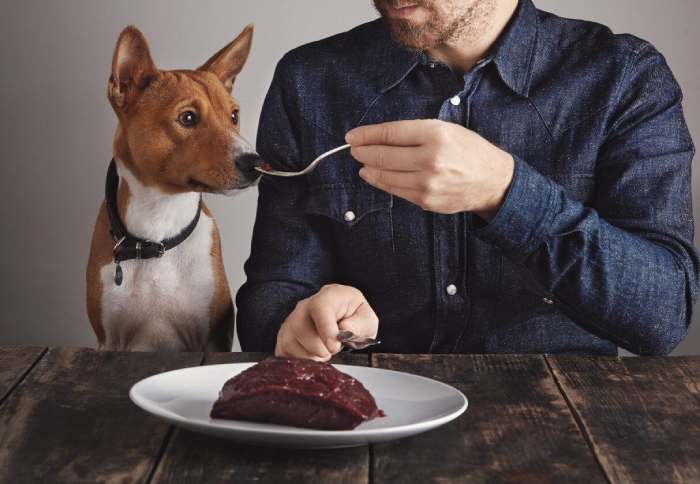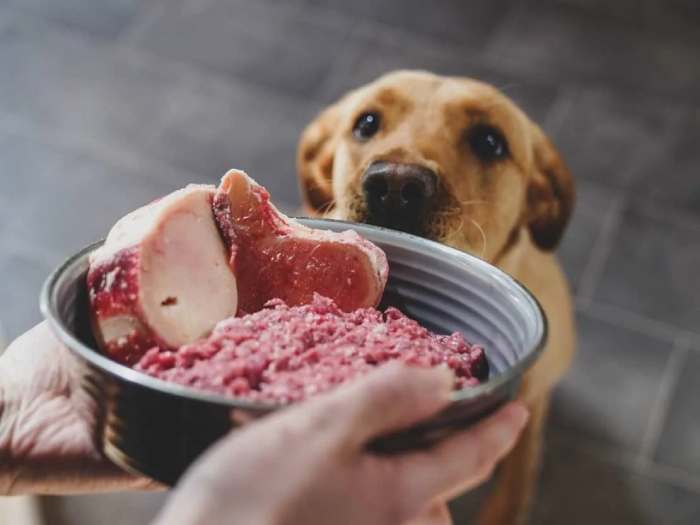You might wonder if beef liver is too rich for your furry friend. Beef liver can be an excellent addition to your dog’s diet.
It provides numerous health benefits, packed with essential nutrients, vitamins, and minerals. However, it’s not all about the benefits; you must be aware of certain risks associated with feeding your dog beef liver, such as vitamin A toxicity.
Also, you must know the right serving size to ensure your pet’s health. Let’s delve into why beef liver could be a good choice for your dog’s diet.
Understanding Canine Dietary Needs: Dogs’ Unique Requirements
Before diving into the specifics of beef liver for your dog, it’s crucial to understand your furry friend’s dietary needs.
Dogs, unlike humans, aren’t naturally inclined towards vegetarianism. They’re carnivores, requiring a diet rich in protein. Yet, it’s not uncommon for dogs to develop canine allergies to specific protein sources, resulting in a need to alter their diet.

Be aware that symptoms of allergies can include skin irritation, digestive issues, and chronic ear infections. It’s important to consult your vet if you suspect an allergy. They may suggest an elimination diet to identify the culprit.
Beef liver can be a high-value protein source for dogs, but understanding your pet’s specific nutritional needs and potential allergies is key before making dietary changes.
Red More: Is Beef Jerky Bad for Dogs?
Nutritional Benefits of Beef Liver:
With all that in mind, let’s delve into why beef liver could be a fantastic addition to your dog’s diet.
- High in valuable nutrients: Beef liver contains vitamins A, B, and iron. These are essential for your dog’s good health and well-being.
- Liver preparation methods: You can serve it raw, cooked, or dehydrated, depending on your pup’s preference and dietary needs.
- Beneficial for canine health: Regular consumption can help maintain your dog’s metabolism, improve their coat, and support their immune system.
- Liver-based recipes: Incorporating liver into your dog’s food isn’t difficult. There are many recipes available that make it easy to give your furry friend a nutritional boost.
Potential Risks of Feeding Beef Liver:
Despite its nutritional benefits, feeding your dog too much beef liver can pose certain health risks.
One significant concern is liver toxicity. As a filtering and detoxifying organ, the liver can accumulate various toxins. Consuming excessive amounts can expose your dog to these toxins, leading to liver damage.
Moreover, allergic reactions could also occur. Like humans, dogs can develop allergies to specific foods, including beef and beef liver. Symptoms can range from skin irritations to gastrointestinal issues like vomiting and diarrhea.
It’s crucial to monitor your dog’s reaction to beef liver, and immediate veterinary attention is needed if any adverse effects are noticed.
Determining Safe and Balanced Portions for Consumption:
You might be wondering how to dish out beef liver for your dog in a safe and beneficial way. Concerning serving frequency and liver preparation, here are some tips:
- Serving Frequency: Feed your dog beef liver once or twice a week. This ensures they get the nutrients they need without overloading their system.
- Size: The serving size should be proportional to your dog’s size. A tablespoon is enough for small dogs, while larger dogs can handle a quarter cup.
- Liver Preparation: Always cook the liver to kill any harmful bacteria. Avoid adding seasonings, as they could upset your dog’s stomach.
- Mixing: Mix the liver with your dog’s regular food to make it more appealing.
Exploring Safer and Nutrient-Rich Options in Dog Diets:
If beef liver isn’t your dog’s favorite, you can try other nutritious organ meats. Chicken liver, for example, is an excellent alternative that’s rich in protein, fat, and vitamins.

Alternatively, consider fish liver, which offers numerous benefits. Its omega-3 fatty acids support heart health, while vitamin A promotes good vision and a healthy immune system.
Sweet potatoes and pumpkin can fill the gap for those seeking vegetarian substitutes. They’re packed with vitamin A, fiber, and other essential nutrients. Spirulina, a type of blue-green algae, is another unique choice. It’s a powerhouse of protein, antioxidants, and B vitamins.
Frequently Asked Questions:
You should feed your dog beef liver sparingly, about once a week. Despite its high liver nutrition, portion control is vital due to its high vitamin A content, which can be toxic in large amounts.
No breed specifically reacts negatively to beef liver. However, individual dogs might have liver allergies or breed sensitivity. Always monitor your pet’s reaction when introducing new foods, especially organ meats like liver.
Yes, you can indeed use beef liver as a training treat. It’s packed with nutrition, making it a healthy reward. Remember, moderation is key due to its high vitamin content, especially vitamin A.
Apart from beef liver, you can safely feed your dog other organs like chicken hearts. Exploring exotic organ options such as kidneys, lungs, and trachea provides them with essential nutrients for a balanced diet.
When preparing beef liver for your dog, first utilize freezing techniques to kill parasites. Then, lightly cook it to maintain the liver’s nutrition. Overcooking can deplete its beneficial nutrients, so be careful with heat.
Conclusion:
So, is beef liver good for dogs?
When served in moderation. It’s a nutritional powerhouse packed with essential nutrients your furry friend needs. But, like all good things, too much can lead to trouble. Always keep serving sizes in check and consider other nutrient-rich alternatives.
Remember, variety is the spice of life, even for your dog’s diet. You’re paving the way to their optimal health and vitality by providing balanced meals.

Hey there, I’m Janet Brooks, a dog-loving student from California. I’m all about helping pups in need, especially those without homes. Me and my awesome friends work together to give shelter and love to stray dogs. Oh, and I also write blogs about dogs to share helpful info.